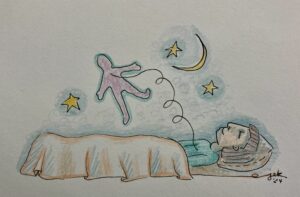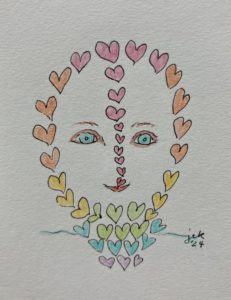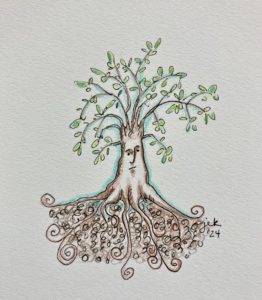
-Artwork © 2024 Jan Ketchel
We are conceived as human beings by our greater Soul, which already resides in infinity. The intent of our life is thus our Soul’s intent, which is that life be physically lived on the stage of our three-dimensional space/time world.
Our Soul asks us to play out its dream question, with free will, in the drama of our human life. When we leave human life, we bring our experiences and discoveries home to our greater Soul’s enrichment, enhancing our personal evolution as well.
We enter human life with a blank-slate amnesia as to our royal ancestry as infinite beings. Our Soul heritage is masked by an ego that must discover and live the drama it has been cast in. This is the part of us that seeks the meaning and purpose of our earthly life.
Beneath our groundedness as physically aging beings, we are still soulful beings who return to our true homeland in infinity, out of physical body, as we sleep and dream each night. The memory of our nightly dreams is the download of our greater life in infinity.
Generally, however, we reenter our physical bodies upon awakening with the same kind of amnesia we experienced when we were first born into this life. Much of what we remember in the morning is distorted by the filter of the ego, who clothes its experiences in infinity with the mindset and images of material reality.
Nonetheless, our waking life experience for the coming day is enriched by our previous night’s dream, where we explored our daily experiences and made new discoveries with our greater Soul in infinity. I am always excitedly aware that the theme of my downloaded dream has already set the stage for the waking adventure to be physically played out in the new day I was just born into.
Attention to, and analysis of the dream, gives me a heads up as to my oncoming waking drama. My subsequent contribution to infinity will be in the outcomes of my decisions and actions as the plot unfolds. Infinity does not know in advance what choices I will make, and thus awaits my findings in our nightly exchanges.
Thus, our waking ego state, beneath its materialist fixation, is actually well acquainted with non-physical living, through its nightly out-of-body journeys in the sleep and dream times of our physical lives. So much so that when we make our final out-of-body departure, at physical death, in our untethered, freed energy-body state, we will actually land in a very familiar landscape.
As we physically age, the veil between dimensions thins, as locales and acquaintances we’ve made in infinite life begin to cross waking boundaries. Oftentimes, what is experienced during Alzheimer’s disease reflects the soulful integration of ego with its greater Soul life in infinity. This indeed generates much confusion for self, and for all in waking life, but it is nonetheless a natural phase of a major transition.
Bob Monroe’s* discoveries of our multidimensional soul states led to his use of sound science to enable explorers to discover that they already lived in states beyond the physical body. Not only does such exploration reduce the fear of physical death but also opens channels to greater conscious integration of ego with Soul states while still living in a physical body.
This was the message that the shaman don Juan Matus imparted to his apprentice, Carlos Castaneda: Evolution for human beings is no longer physical, it’s energetic. The energy body soul state, that runs our physical body in waking life, is evolving in its conscious participation in life beyond the physical body, in what is called the astral dimension.
Bob Monroe visited the future of our planet in a permutation of potential evolutionary trends, where human beings lived primarily on Earth in their energy body state, with the creative power of their intentions shaping the world, devoid of reliance upon physical manipulation of the environment to survive.
We are currently living through a developmental leap of merging potentialities from subtle energetic life with physical life. Our current struggles on Earth are intermingled with both the light and dark forces of the astral realm, as we dream the human dream forward into a whole new dimension. The confusions of Earth life now resemble the course of Alzheimer’s disease on a mass scale, as we struggle to integrate it all.
Our greater Soul has assigned us the task to discover the path to sustainable balance, as we collectively advance the Earth dream. The knowledge accrued through the myriad of experiments we all perform in the daily dramas of our lives is ultimately manifesting that path of heart.
Dreaming it forward, with heart,
Chuck
*Robert Monroe, Founder of The Monroe Institute in Faber, Virginia




